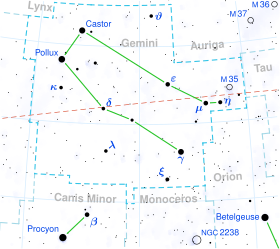
| |
| Observation data Epoch J2000.0 Equinox J2000.0 (ICRS) | |
|---|---|
| Constellation | Gemini |
| Right ascension | 07 39 09.93286 |
| Declination | +34° 35′ 03.6443″ |
| Apparent magnitude (V) | 4.90 |
| Characteristics | |
| Spectral type | F3 III |
| U−B color index | +0.09 |
| B−V color index | +0.41 |
| Astrometry | |
| Radial velocity (Rv) | +7.3 km/s |
| Proper motion (μ) | RA: -33.42 mas/yr Dec.: -118.17 mas/yr |
| Parallax (π) | 19.61 ± 0.30 mas |
| Distance | 166 ± 3 ly (51.0 ± 0.8 pc) |
| Absolute magnitude (MV) | 1.35 |
| Details | |
| Radius | 3.7 R☉ |
| Luminosity | 24 L☉ |
| Surface gravity (log g) | 3.56 cgs |
| Temperature | 6,309 K |
| Metallicity | +0.12 dex |
| Rotational velocity (v sin i) | 91.1 km/s |
| Age | 1 Gyr |
| Other designations | |
| Jishui, ο Gem, 71 Geminorum, BD+34° 1649, FK5 2592, HD 61110, HIP 37265, HR 2930, SAO 60247. | |
| Database references | |
| SIMBAD | data |
Omicron Geminorum (ο Geminorum, abbreviated Omicron Gem, ο Gem), also named Jishui, is a solitary star in the constellation of Gemini. It is faintly visible to the naked eye with an apparent visual magnitude of 4.90. Based upon an annual parallax shift of 19.61 mas, it is located at a distance of 166 light-years from the Sun.
Nomenclature
ο Geminorum (Latinised to Omicron Geminorum) is the star's Bayer designation.
The star bore the traditional Chinese name of Jishui. In 2016, the IAU organized a Working Group on Star Names (WGSN) to catalog and standardize proper names for stars. The WGSN approved the name Jishui for this star on 30 June 2017 and it is now so included in the List of IAU-approved Star Names.
It was also known to be part of a much bigger constellation named Telescopium Herschelii before it was unrecognized by the International Astronomical Union (IAU).
Properties
This is an F-type giant star with a stellar classification of F3 III. The measured angular diameter is 0.68±0.03 mas, which, at its estimated distance, yields a physical size of about 3.7 times the radius of the Sun. It radiates approximately 24 times the solar luminosity from an outer atmosphere at an effective temperature of 6,309 K.
References
- ^ van Leeuwen, F. (2007), "Validation of the new Hipparcos reduction", Astronomy and Astrophysics, 474 (2): 653–664, arXiv:0708.1752, Bibcode:2007A&A...474..653V, doi:10.1051/0004-6361:20078357, S2CID 18759600.
- ^ Mermilliod, J.-C. (1986), "Compilation of Eggen's UBV data, transformed to UBV (unpublished)", Catalogue of Eggen's UBV Data, SIMBAD, Bibcode:1986EgUBV........0M.
- ^ Eggen, O. J. (1962), "Space-velocity vectors for 3483 stars with proper motion and radial velocity", Royal Observatory Bulletin, 51: 79, Bibcode:1962RGOB...51...79E.
- Wielen, R.; et al. (2000), "Sixth Catalogue of Fundamental Stars (FK6). Part III. Additional fundamental stars with direct solutions", Veröffentlichungen Astronomisches Rechen-Institut Heidelberg, vol. 37, no. 37, Karlsruhe: Verlag G. Braun, pp. 1–308, Bibcode:2000VeARI..37....1W, ISBN 3-7650-0536-3.
- ^ Holmberg, J.; et al. (July 2009), "The Geneva-Copenhagen survey of the solar neighbourhood. III. Improved distances, ages, and kinematics", Astronomy and Astrophysics, 501 (3): 941–947, arXiv:0811.3982, Bibcode:2009A&A...501..941H, doi:10.1051/0004-6361/200811191, S2CID 118577511.
- ^ Lang, Kenneth R. (2006), Astrophysical formulae, Astronomy and astrophysics library, vol. 1 (3rd ed.), Birkhäuser, ISBN 3-540-29692-1.. The radius (R*) is given by:
- ^ McDonald, I.; et al. (2012). "Fundamental Parameters and Infrared Excesses of Hipparcos Stars". Monthly Notices of the Royal Astronomical Society. 427 (1): 343–57. arXiv:1208.2037. Bibcode:2012MNRAS.427..343M. doi:10.1111/j.1365-2966.2012.21873.x. S2CID 118665352.
- ^ Schröder, C.; Reiners, Ansgar; Schmitt, Jürgen H. M. M. (January 2009), "Ca II HK emission in rapidly rotating stars. Evidence for an onset of the solar-type dynamo" (PDF), Astronomy and Astrophysics, 493 (3): 1099–1107, Bibcode:2009A&A...493.1099S, doi:10.1051/0004-6361:200810377
- "* omi Gem". SIMBAD. Centre de données astronomiques de Strasbourg. Retrieved 2016-12-07.
{{cite web}}: CS1 maint: postscript (link) - ^ "Naming Stars". IAU.org. Retrieved 16 December 2017.
- Eggleton, P. P.; Tokovinin, A. A. (September 2008), "A catalogue of multiplicity among bright stellar systems", Monthly Notices of the Royal Astronomical Society, 389 (2): 869–879, arXiv:0806.2878, Bibcode:2008MNRAS.389..869E, doi:10.1111/j.1365-2966.2008.13596.x, S2CID 14878976.
- "WG Triennial Report (2015-2018) - Star Names" (PDF). p. 7. Retrieved 2018-07-14.
- "IAU Working Group on Star Names (WGSN)". Retrieved 22 May 2016.
- Richichi, A.; et al. (February 2005), "CHARM2: An updated Catalog of High Angular Resolution Measurements", Astronomy and Astrophysics, 431 (2): 773–777, Bibcode:2005A&A...431..773R, doi:10.1051/0004-6361:20042039.
| Constellation of Gemini | |||||||||||||
|---|---|---|---|---|---|---|---|---|---|---|---|---|---|
| Stars |
| ||||||||||||
| |||||||||||||
| Star clusters |
| ||||||||||||
| |||||||||||||
| Galaxies |
| ||||||||||||
| |||||||||||||
